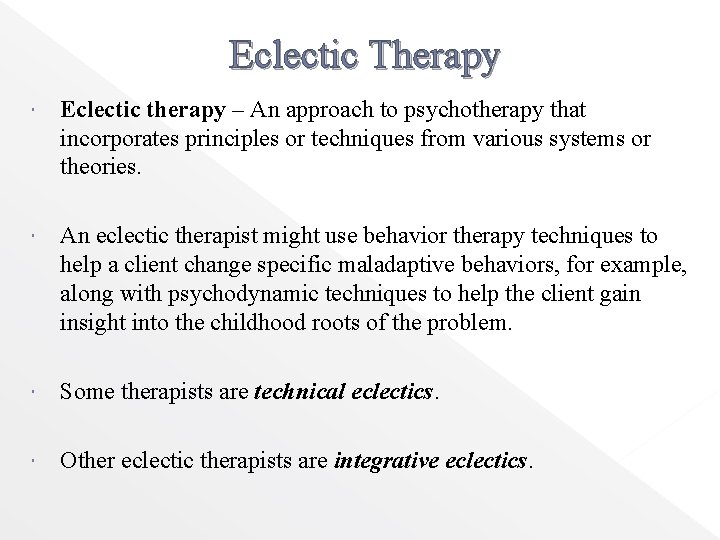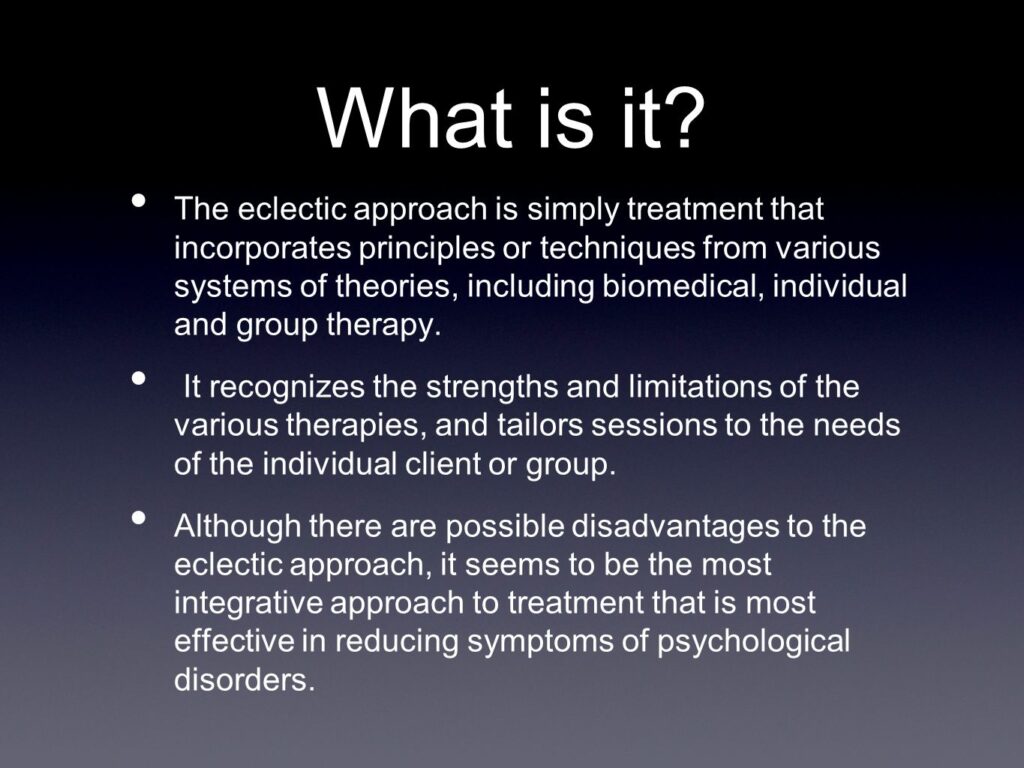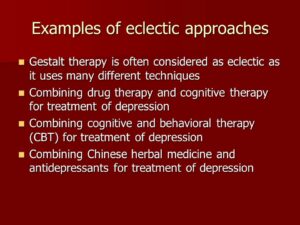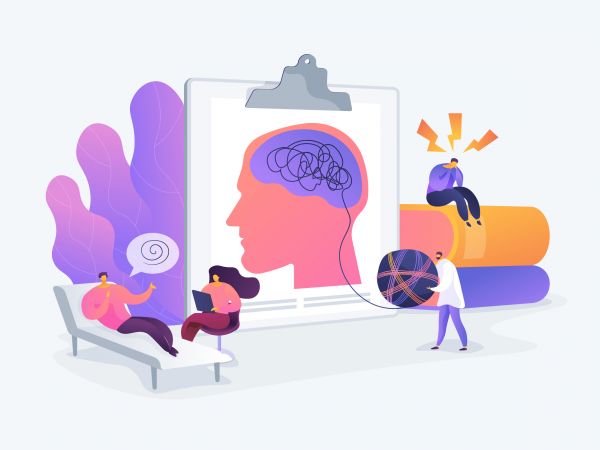Eclectic therapists and eclectic therapy are quite popular, as eclectic therapy is very beneficial for many people. If you’re considering eclectic therapy, this article will provide an introduction to the concept, application, and evaluation of eclectic psychology and eclectic therapy.
Contents
Understanding Eclectic Psychology

Eclectic psychology is a term used to describe the approach of combining two or more psychological theories to form one’s psychotherapy. Merriam-Webster defines eclectic as “made up of elements drawn from different sources.”
In other words, eclectic therapy is a personalized approach to therapy that incorporates various techniques and theories from different psychological approaches.
Theory Behind Eclectic Psychology
There is no one unified theory behind eclectic psychology. Rather, it is a term used to describe the approach of incorporating multiple theories into one’s psychotherapy. However, some core principles underlie eclectic therapy.
- First, eclectic therapists believe in using whatever techniques and therapies are best suited for the individual client, rather than adhering to any one particular approach.
- Second, eclectic therapists believe in using a variety of techniques and approaches to tailor therapy to the individual client’s needs/personalized treatment plans.
- And third, eclectic therapists believe in constantly evaluating and re-evaluating the effectiveness of therapy, making changes as needed. Thus, this makes it a flexible and adaptable treatment plan.
These principles are based on the idea that no one theory or approach is best for all people, and that each person’s needs vary. Therefore, therapists need to be flexible and adaptive in their approach. That is by using a variety of techniques and therapies to meet the individual client’s needs.
Therapies Based on Eclectic Psychology
There are a variety of therapies that can be based on eclectic psychology. The most common approaches are cognitive-behavioral therapy (CBT), humanistic therapy, and psychodynamic therapy. However, many other approaches could be used as well, such as family systems therapy, solution-focused therapy, and reality therapy.
It is important to note that not all therapies need to be based on eclectic psychology. Many therapists use a single approach in their work. However, for those who do choose to use an eclectic approach; it is important to be familiar with a variety of different approaches and techniques.
History, And Development
Eclectic therapy has a long history, with roots in both Eastern and Western psychology.
- The term “eclectic” was first coined by German psychiatrist Karl Jaspers in the early 1900s.
- In the 1930s, American psychologist William James also used the term “eclectic” to describe his approach to psychology.
- The first use of the term “eclectic therapy” was in a paper by therapist Carl Rogers in 1951.
Rogers described eclectic therapy as “a technique which is not restricted to any one system but instead uses whatever seems to be helpful from any systems.” Since then, eclectic therapy has become increasingly popular. As research has shown that a variety of different approaches can be effective in treating mental health conditions.
Unfolding Eclectic Therapy

How Does It Work
It is also important to note that eclectic therapy is a collaborative process. This means that you will be actively involved in your treatment. Furthermore, your therapist will provide guidance and support. But it is up to you to put the techniques into practice and make changes in your life. So, if you are willing to work hard and commit to change, eclectic therapy can be an effective treatment for a variety of mental health conditions.
What To Expect
If you are considering eclectic therapy, there are a few things you can expect.
- First, your therapist will likely ask you about your goals for therapy.
- Next, your therapist will assess your current situation and make recommendations about the best approach for you.
- Your therapist will then work with you to tailor a treatment plan that meets your needs. This may include a combination of different techniques and approaches.
- Finally, your therapist will evaluate the effectiveness of therapy and make changes as needed.
Who Can It Help
Eclectic therapy can be an effective treatment for a variety of mental health conditions, including:
- Anxiety
- Depression
- Bipolar disorder
- Obsessive-compulsive disorder (OCD)
- Posttraumatic stress disorder (PTSD)
- Eating disorders
- Addiction
Eclectic therapy has also been shown to be effective in treating mental health conditions in children and adolescents.
Techniques Used In Eclectic Therapy
There are a variety of different techniques that can be used in eclectic therapy, including:
- Psychodynamic therapy
- Solution-focused therapy
- Interpersonal therapy (IPT)
- Cognitive-behavioral therapy (CBT)
- Dialectical behavioral therapy (DBT)
Your therapist will likely use a combination of different techniques and approaches to tailor treatment to your individual needs.
Evaluating Eclectic Therapy
Eclectic therapy is an effective treatment for a variety of mental health conditions. However, like any therapy, it is important to evaluate the effectiveness of eclectic therapy and make changes as needed. Your therapist should periodically assess your progress and adjust your treatment plan as needed.
Benefits of Eclectic Therapy
There are several benefits of eclectic therapy, including:
- The opportunity for a more personalized treatment plan
- The flexibility to tailor treatment to the individual’s needs
- The ability to use a variety of different techniques and approaches
Limitations of Eclectic Therapy
There are also some limitations of eclectic therapy, including:
- It can be difficult to commit to the process of change
- There is no one-size-fits-all approach to mental health treatment
- It is not always easy to find a therapist who is training in eclectic therapy
Why Consider It
If you are looking for a flexible, individualized treatment approach, eclectic therapy may be a good fit for you. Because this type of therapy allows for a lot of flexibility.
So it can be adapted to meet the unique needs of each person. Furthermore, the therapist will work with you to find the best approach for your situation and help you make changes in your life.
Finding an Eclectic Therapist

How To Find One
The first step is to find a therapist. So:
- You can ask your doctor for a referral or
- Search for a therapist online.
What To Look Out For
There are a few things to keep in mind while finding an eclectic therapist. For instance:
- First, it is important to find a therapist who has formal training in this type of therapy.
- Second, you should look for a therapist who is willing to tailor treatment to your individual needs.
- Third, it is important to find a therapist who is open to making changes as needed.
Red Flags To Avoid
When searching for an eclectic therapist, there are a few red flags to avoid. For instance:
- First, be careful of any therapist who is not open to feedback.
- Second, avoid any therapist who is not willing to make changes as needed.
- Third, be wary of any therapist who claims that they have a one-size-fits-all approach to mental health treatment.
Pursuing Training In Eclectic Therapy
If you are a mental health professional who is interested in pursuing training in eclectic therapy, there are a few things to keep in mind.
- First, it is important to get training in a variety of different therapy approaches.
- Second, you should be open to adapting your approach to meet the needs of each individual client.
- Third, it is important to be willing to make changes as needed.
You can pursue training in eclectic therapy by taking courses at a local college or university, or you can find online courses to take.
NOTE: We invite you to list yourself on Therapy Mantra’s Eclectic Therapist Directory.
Hearing from Experts

If you are considering eclectic therapy, it may be helpful to hear from experts in the field.
“Eclectic therapy is an approach to psychotherapy that draws on different theories and techniques from various psychological schools of thought. Thus, the therapist chooses from among these different approaches what he or she believes will work best for the individual client.” – Dr. John Doe, Psychologist
Case Study
Mary is a 38-year-old woman who has been struggling with anxiety and depression for the past few years. Then, her therapist has recommended that she try eclectic therapy.
Mary begins by meeting with her therapist to discuss her goals for treatment. Subsequently, together, they develop a plan that includes a combination of different techniques, such as CBT, DBT, and IPT.
Later on, Mary attends weekly therapy sessions and begins to see a significant improvement in her symptoms. Consequently, she can better manage her anxiety and depression and feels more hopeful about the future.
Resources
If you have an interest in learning more about eclectic therapy, there are a few resources that can help. For instance:
- The American Psychological Association has an article called “Eclectic Psychotherapy: An Overview.”
- The National Institute of Mental Health has an article called “What is Eclectic Therapy?”
Conclusion
Eclectic therapy is a type of therapy that is easy to tailor to the individual’s needs. As a result, it can be an effective treatment for a variety of mental health conditions. However, it is important to find a therapist who has prior training in this type of therapy. And who is open to making changes as needed.
Thus, if you are considering eclectic therapy, it may be helpful to hear from experts in the field. There are a few resources that can help you learn more about this type of therapy.
A Word From Therapy Mantra
Your mental health — Your psychological, emotional, and social well-being — has an impact on every aspect of your life. Positive mental health essentially allows you to effectively deal with life’s everyday challenges.
At TherapyMantra, we have a team of therapists who provide affordable online therapy to assist you with issues such as depression, anxiety, stress, workplace Issues, addiction, relationship, OCD, LGBTQ, and PTSD. You can book a free therapy or download our free Android or iOS app.


